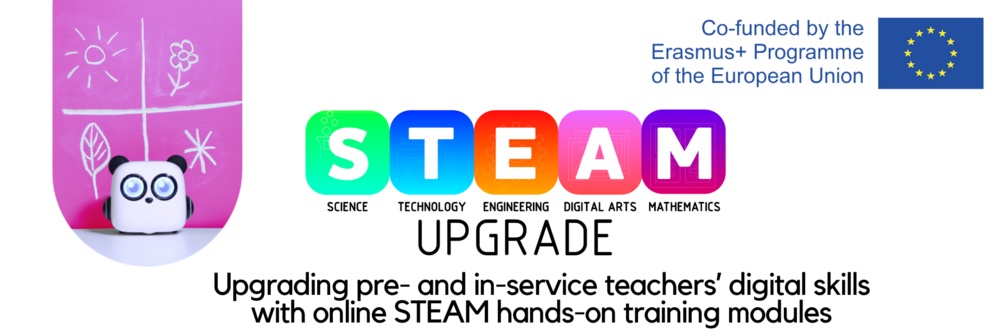Upgrading pre- and in-service teachers’ digital skills with online STEAM hands-on training modules.

Through the project the following packages for STEAM projects & activities have been produced, in six different languages:
English | Estonian | German | Spanish | Norwegian | Finnish
General information about the project
There is a widely recognized consensus regarding the significance of incorporating STEM-related subjects into children's education. In today's world, technology plays a pivotal role in most aspects of our daily lives, offering solutions to various modern societal challenges. Consequently, the process of digitization and the pervasive influence of technology are only set to increase. In this context, an educational system that fails to equip children with a solid foundation and familiarity with digital tools will leave them unprepared for their future roles in our increasingly digital societies.
The current situation presents a dual perspective. On one hand, many secondary education students are entering universities, vocational training, or the workforce equipped with highly relevant digital skills. On the other hand, there is still a significant portion of students with limited digital and technological literacy.
To address this issue, current educational policies advocate for an increased emphasis on STEAM (Science, Technology, Engineering, Arts, and Mathematics) disciplines, introduced to students from an early age. However, a major obstacle to achieving this goal is the insufficient expertise among many teachers. This is primarily due to three main factors: the rapid pace of technological advancements, the limited formal education of teachers in STEM-related subjects, and the constraints on teachers' time to engage in the necessary training activities.
This proposal is aimed at a target audience comprising both pre-service and in-service teachers, as well as students pursuing education degrees, across three educational levels: early childhood, primary, and secondary education. The primary objective of this project is to establish an environment that reinforces the STEAM skills of this target group. This environment will help rectify the aforementioned situation by enabling the target group to incorporate STEAM-related activities into their daily classroom routines. The project activities will involve the creation of training materials for teachers, the development of guidelines to enhance teacher engagement with STEAM concepts and activities, the establishment of a virtual laboratory, and the creation of an educational resource repository. Additionally, the project will conduct pilot tests and dissemination activities. The ultimate outcome of this project will be the integration of digitally-skilled teachers into the existing education system.
The project consortium comprises five universities and two companies from six European countries, with the University of Tallinn serving as the coordinating institution. The other participating universities are the University of Stavanger, the University Rey Juan Carlos in Madrid, the University of Jyväskylä, and the Johannes Kepler University in Linz. This consortium forms a multidisciplinary group with prior research collaborations in various areas relevant to the project. MISTEMS I&S Ltd. and CraftUnique, the two companies in the consortium, will provide technological support for project development.
From a methodological perspective, this project aligns with the European Digital Competences Framework for Educators (DigCompEdu), which details how digital technologies can enhance and innovate education and training. It also adheres to the STEAM Education approach, which employs these subjects as entry points for guiding student inquiry, promoting dialogue, and cultivating critical thinking. To encourage hands-on learning, the project proposes STEAM online training modules in the form of interactive digital open resources, focusing on real-world social challenges that can be prototyped or simulated with STEAM kits. Each learning resource will follow e-text theories and apply the didactic method principles proposed by M. David Merrill: "Tell, Show, Ask, Do."
In summary, this proposal aims to lay the groundwork for the wider integration of technology-based methods and activities into mainstream education by enhancing the digital skills of pre- and in-service teachers through higher education courses.